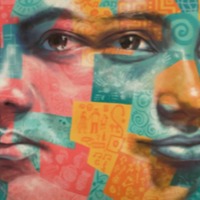
I want to now be called Patience. This will be my new name because I want to forget about all my past and start a new identity in life. I was about ten years old when I was brought across the border to become a trokosi. I was abandoned in the shine by my relatives for the rest of my life. When I was being brought I was given no reason, I only remember that I had a lot of beads on my waist. I brought a bundle which was stuffed with a stool, cloth, broom, plates and some other items, placed on my head to carry for the journey. We crossed the border into Ghana, and when we got there I was taken through some rituals and was finally left in the shrine. My relatives came from Togo to visit me a few times but I never saw my mother. They only told me she lives at Togo.
At the shrine there were some other trokosis but I was the youngest. They sent me on errands and gave me food to eat. Later I started joining them to the farm. My education ended when I came to the shrine. When I grew up, I asked the priest why I was brought to the shrine in Ghana, because my relatives came from Togo to visit and I got to know that I belonged to a different country. He said I came to atone for the death of my relatives who were involved in a land litigation case with another party. My relatives were cursed at the shrine for trying to possess a piece of land which did not belong to them. Many people had died, including my father. I was therefore brought here so that people would stop dying rapidly under strange circumstances. I was not given any definite time to serve at the shrine, after which I should return to my country.
Life had the shrine had not been easy. As a child, I had to fend for myself, apart from going to farm for the priest. My basic needs were provided by myself. I went to the bush to cut trees and burnt charcoal for sale. I also sold firewood. As a trokosi you had no rights over the fruits of your labor. We were threatened that if you earned money for yourself you would die. Thus whatever we sold, we gave it to the priest. He collected all the money, and if it pleased him, he would determine how much to give you. I saved and bought soap, food, panties, etc, from this. The only times that I worked extra hard to make some money off farming was when some fruits were in season. I picked baba fruits from the bush, which I pounded for sale. I picked mangos for sale when it was season.
When I became an adolescent and had my second menstruation, the priest instructed me to be sending food to his younger brother in his hut. One day when I sent the food again, he seized me and raped me. I cried and complained but was told to shut up. This continued until I got pregnant. I later realized that it was an arrangement between the priest and his brother. I had a baby girl later. I continued to cohabit with him and now I have three children. My husband does not take care of us. He beats me up mercilessly and there is nobody to complain to. I enrolled my children in the primary school in town and they are schooling.
When life became tough for me, I decided to run away from the shrine for a while. The priest heard this and he cautioned that the curse I came to redeem from my family would follow me. Misfortune would follow me and I would fall sick and die. I was frightened but later on gathered courage to leave my children and go, because we were hungry. I followed a woman from our community to Accra. She gave me some money which I paid her later. I slept on the floor in a long room with many other strange people. The next day I paid for the floor, a bucket of water for my bath, and rented a bowl. I joined other porters. We carried loads for people and they paid us what we bargained with them. I saved some money from this and send some provisions and clothing to my children. While I carried foodstuff for one of my customers one day, she engaged me in conversation. She sympathized with me. She requested that I leave that job and work with her to sell eggs. I felt very sick and returned to the shrine. The priest said it was the curse and he told me would follow me. I went through some rituals.
When I recovered I left for Accra again, because I was committed to paying the debt to the egg-seller. I explained my problem to the operator and we entered into an agreement that she would pay the debt while I would work for her for one year without pay. She would however provide me with free meals. I had joined the woman for four months, when I heard my daughter was very ill. She gave me some money to buy provisions and send my daughter to the hospital. When my daughter recovered a little I returned to Accra but paid her visits with money from my employer. I had worked for the woman for about eight months when I had information to return to the shrine to be liberated from the trokosi system. I was liberated on the 9th of July, 2002.
Narrative as told to International Needs-Ghana, February 2004, in the Volta region of Ghana, West Africa.









